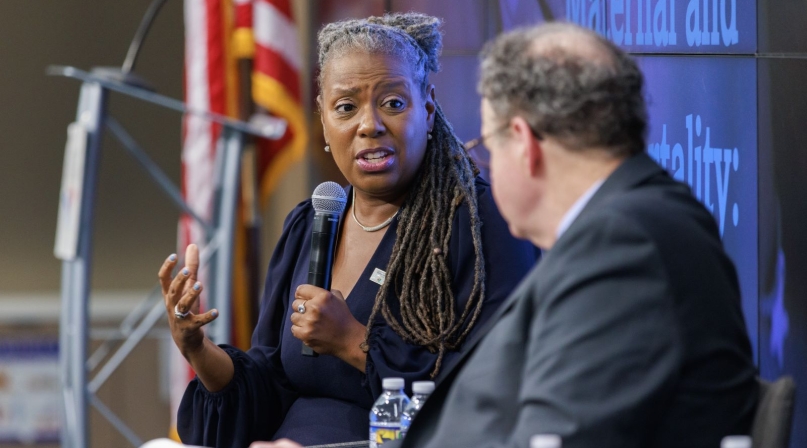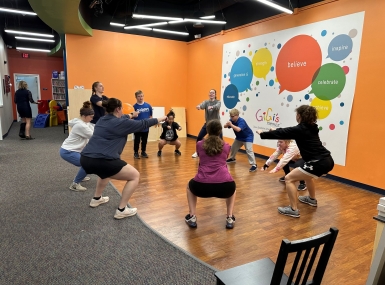Harris County boosts care to reduce Black infant and maternal mortality

If counties want to help decrease Black infant and maternal mortality rates, their best bet may be to invest in improving the social determinants of health for residents. Support from elected officials helps quite a bit, too.
That’s Barbie Robinson’s take, which has informed the Black Maternal Health Program in Harris County, Texas, where she is executive director of the public health department.
“We’re not moving the needle, because we have not adequately really thought about the root causes that have given rise to this preventable public health crisis that is impacting Black moms and babies,” she said Oct. 16 at an event on the topic hosted by NACo in Washington, D.C. In Harris County, Black infants are three times more likely to die than white infants and 1.5 times more likely to be born pre-term.
“What we’re really struggling with, and what local government often struggles with, is we have the rallying cry for money, we have the rallying cry for new programs, but it’s the approach in how we’re trying to address these issues that I see as the limiting factor.”
Done right, the outcomes could improve for families while eliminating duplicative spending. It means addressing symptoms that result from conditions including access to comprehensive, high-quality health care services, living environments that promote health and safety and social and community support.
“We need a system that allows us to think holistically and in an integrated way,” she said. “Nothing’s worse than trying to navigate siloed, fragmented systems and tell your story over and over and over again,” with each service provider limiting themselves to their scope of responsibility and not making external connections, noting that the process wastes money with every duplicative appointment.
Robinson joined officials from Wayne County, Mich. and Cook County, Ill. to address Black maternal and infant mortality at NACo’s City-County Conference Center, bound by the distinction that if they collectively reduced their Black infant mortality rates by 9%, the United States would achieve equity regarding infant mortality. That illustrates the large populations of those counties — 11.8 million.
Harris County’s Black Maternal Health Program is providing a cohort of up to 200 with services to address the need for health care access and quality, including providing prenatal medical visits and parenting resources, and links to additional services like food assistance, substance use disorder services, counseling and mental health services and job placement support. The county allocated $7.7 million for the program, largely from the American Rescue Plan Act.
The fragmented human services system, Robinson said, creates frustration and poor health outcomes for residents and mounting costs for providers, in most cases the counties. And their success, she argued, would relieve their reliance on government assistance.
“Until now, we’ve not really designed systems that focus on getting people out of the safety net to improve well-being and self-sufficiency,” she said.
“This model is really not just ‘How do we improve access?’ because right now, we have a certain level of access that still leads to these kinds of poor outcomes, this model is really about getting people out of the safety net system and the value proposition is more effective and efficient government administration.”
Although Harris County has focused on a specific issue in Black infant and maternal mortality, Robinson said the progress will demonstrate the wide applicability of addressing social determinants of health.
“While we’re focusing today on Black maternal health, this model is really agnostic to the population in the sense that if you are someone who has needs that span across the social safety net, this is a model for you,” she said.
In addition to auditioning for further federal investment, Robinson wants to make the case for federal policies that ease restrictions on data-sharing to enhance care coordination between entities.
“If the federal government along with state government was able to build out procedures that allowed us to share data more effectively and more efficiently, that would really enable us to be more effective,” she said. “I really wish federal representatives could spend a day in the life, not for the dog and pony show of a focus group, but the day in the life of an individual trying to access our systems.”
Before health and human service practitioners can reshape their service delivery systems, they need the support and direction from their elected officials, who can set the agenda for improving services and direct policy.
“The number one barrier is the lack of elected leader championship,” she said. “It really requires that foundational work, to set the stage that this is a model that local government values, places importance on and prioritizes, starting with the resolution that says ‘Thou shalt create these system safety net departments to achieve these kinds of outcomes of not just getting people into services but getting them out of it to greater well-being.’”
Robinson had backup in Washington from Harris County Commissioners Lesley Briones and Rodney Ellis.
“It is imperative that we act with a greater sense of urgency because our babies are depending on us,” Briones said.
She credited ARPA with making the initial investment in the Black Maternal Health Program possible.
“Without the direct allocation of ARPA funds we would not have had that freedom,” to be innovative with the program, she said. “We are able to have this integrated, this holistic, ‘no wrong door’ approach to making sure these siloed services are coming together so we can track the data, track these individuals to have the safety net system work for them and then work so well that we get them out of the safety net.”
Event On-Demand
Breaking Down Silos to Address Maternal and Infant Mortality: Lessons from the Local Level
During this signature event, attendees heard from county leaders, national experts, and partners as they examine potential solutions through peer-to-peer information exchanges and policy discussions.










